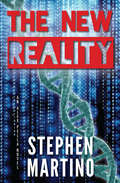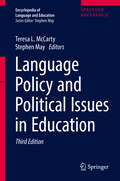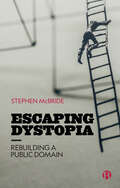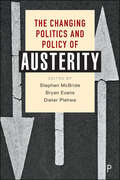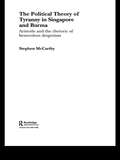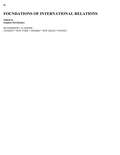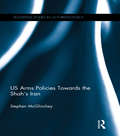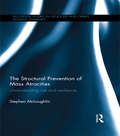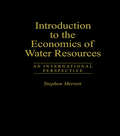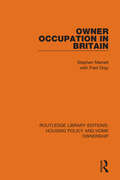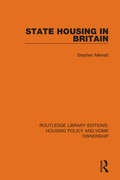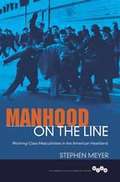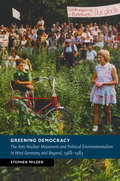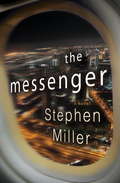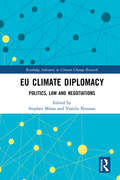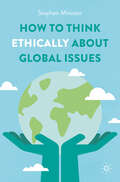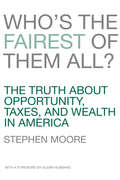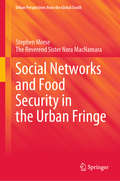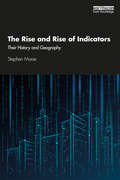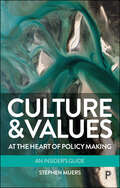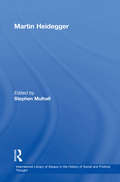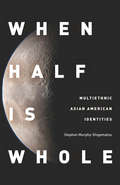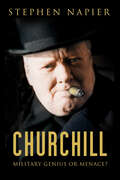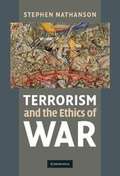- Table View
- List View
The New Reality: An Alex Pella Novel (Alex Pella #1)
by Stephen MartinoAuthor Stephen Martino delivers an action-packed medical thriller in a heart-stopping race to save humanity. In the year 2080, a deadly retrovirus is inadvertently released upon the planet. Facing financial ruin and catastrophic loss of life, the world's nations turn to acclaimed neuroscientist Alex Pella and NIH expert Marissa Ambrosia. Assembling a team of experts, the scientists begin an international search for the cure while fighting off a foreign elite military unit sent to stop them at all costs. Guided by a code concealed within the Hebrew text of the Old Testament, the scientists must traverse ancient lands and solve a biblical riddle in their quest to save humanity from its eminent destruction. Drawing from both our nation's politically charged environment and the worldwide economic crisis, The New Reality follows Alex Pella on a journey that projects a frightening path for human existence in the twenty-first century.
Language Policy and Political Issues in Education
by Teresa L. Mccarty Stephen MayLanguage has too often been studied in isolation from the social and political conditions in which it is used. The late David Corson, the General Editor of the first edition of the Encyclopedia of Language and Education, held the position that an acute understanding of theory was a necessary prerequisite for action, not an alternative to it, especially if one were hoping to change policies for the better. The contributions in this volume acknowledge the centrality of the politics of language, highlighting the importance of the social and political contexts of language policy and language education. This is one of ten volumes of the Encyclopedia of Language and Education. The Encyclopedia bears testimony to the dynamism and evolution of the language and education field, as it confronts the ever-burgeoning and irrepressible linguistic diversity and ongoing pressures and expectations placed on education around the world.
Escaping Dystopia: Rebuilding a Public Domain
by Stephen McBrideMultiple crises have led many to conclude that the current economic and political system is broken. The present and future look increasingly precarious – if not outright dystopian Stephen McBride calls for radical solutions to these crises to provide a more rational and sustainable future. He critiques other potential responses which would further curtail democracy and increase the inequalities associated with neoliberal globalism. Demonstrating how mainstream ideas, powerful interests and political institutions face major challenges but block progressive alternatives, he argues that for radical transformation to succeed, institutional changes are necessary.
The Changing Politics and Policy of Austerity
by Stephen McBrideThis collection of original essays explores the myriad expressions of austerity since the 2008 financial crisis. Case studies drawn from Canada, Australia and the European Union provide extensive comparative analysis of fiscal consolidation and the varied political responses against austerity. Contributions examine such themes as privatization, class mobilization and resistance, the crisis of liberal democracy and the rise of the far right. The potential impact of the COVID-19 pandemic in shaping future austerity and alternatives is signalled. Given the rapidly shifting terrain, this comprehensive handbook provides important insights into a complex and fast-changing period of politics and policy.
The Political Theory of Tyranny in Singapore and Burma: Aristotle and the Rhetoric of Benevolent Despotism (Routledge Contemporary Southeast Asia Series #Vol. 8)
by Stephen McCarthyCovering various fields in political science, this new book presents an historical and political-cultural analysis of Buddhism and Confucianism. Using Singapore and Burma as case studies, the book questions the basic assumptions of democratization theory, examining the political science of tyranny and exploring the rhetorical manipulation of religion for the purpose of political legitimacy. A welcome addition to the political science and Asian studies literature, McCarthy addresses many of the current issues that underlie the field of democratization in comparative politics and discusses the issue of imposing Western cultural bias in studying non-Western regimes by analyzing rhetorical traits that are universally regular in politics.
Foundations Of International Relations
by Stephen McGlincheyAn engaging introduction to the core concepts, theories, actors and issues in global politics. Featuring a combination of chapters authored by leading scholars, researchers and practitioners from around the world, this textbook takes into account the historical development of international relations and the web of dynamics that forms the subject, resulting in a clear analysis of the field from a variety of perspectives. Chapters cover topics including race, colonialism, gender, sexuality, digital globalization, the environment and security studies and are supported by a range of case studies, key boxes and illustrative material to aid students in their practical application of theoretical ideas. The book is also complimented by a bespoke curated website, featuring a regularly updated collection of interactive learning material and hosted on E-International Relations, the world's leading open access IR website. Portraying the most compelling issues of our time, and presenting the necessary tools to analyse and debate the subject, this is an invaluable resource for anyone studying international relations.
US Arms Policies Towards the Shah's Iran (Routledge Studies in US Foreign Policy)
by Stephen McGlincheyThis book reconstructs and explains the arms relationship that successive U.S. administrations developed with the Shah of Iran between 1950 and 1979. This relationship has generally been neglected in the extant literature leading to a series of omissions and distortions in the historical record. By detailing how and why Iran transitioned from a primitive military aid recipient in the 1950s to America’s primary military credit customer in the late 1960s and 1970s, this book provides a detailed and original contribution to the understanding of a key Cold War episode in U.S. foreign policy. By drawing on extensive declassified documents from more than 10 archives, the investigation demonstrates not only the importance of the arms relationship but also how it reflected, and contributed to, the wider evolution of U.S.-Iranian relations from a position of Iranian client state dependency to a situation where the U.S. became heavily leveraged to the Shah for protection of the Gulf and beyond – until the policy met its disastrous end in 1979 as an antithetical regime took power in Iran. This book will be of interest to students and scholars of Middle East studies, US Foreign Policy and Security studies and for those seeking better foundations for which to gain an understanding of U.S. foreign policy in the final decade of the Cold War, and beyond.
The Structural Prevention of Mass Atrocities: Understanding Risk and Resilience (Routledge Studies in Genocide and Crimes against Humanity)
by Stephen McLoughlinThis book offers a different approach to the structural prevention of mass atrocities. It investigates the conditions that enable vulnerable countries to prevent the perpetration of such violence. Structural prevention is commonly framed as the identifying and ameliorating of the ‘root causes’ of violent conflict, a process which typically involves international actors determining what these root causes are, and what the best courses of action are to deal with them. This overlooks why mass atrocities do not occur in countries that contain the presence of root causes. In fact, very little research has been conducted on what the causes of peace and stability are, particularly in relatively countries located in regions marred by civil war and mass atrocities. To better understand how such vulnerable countries prevent the commission of mass atrocities, this book proposes an analytical framework which enables not only an understanding of risk which arises from the presence of root causes, but also of the factors that build resilience in countries, and consequently mitigate and manage such risk. Using this framework, three countries – Botswana, Zambia and Tanzania, are analysed to account for their long term stability despite their location in neighbourhoods characterised by decades of civil war, ethnic repression and mass atrocities. This work is a significant contribution to the field of genocide studies and crimes against humanity and will be of interest to students and scholars alike.
Introduction To The Economics Of Water Resources: An International Perspective
by Stephen MerrettFirst published in 1997. Routledge is an imprint of Taylor & Francis, an informa company.
Owner-Occupation in Britain
by Stephen MerrettOriginally published in 1982, this is a companion volume to State Housing in Britain. Together the 2 volumes cover the tenure of some 85% of all British households in much of the 20th Century. The development of the tenure between 1918 and 1970 with special reference to its position in state housing policies is examined. Subsequent chapters analyse effective demand since 1970, both with respect to its demographic base and as regards the capacity to buy. In particular the question of why people want to buy is asked and the supply of housing (both council houses and former private rented accommodation) as well as the output of speculative housebuilders is considered. A detailed survey of the perturbations in the housing market during the volatile experience of the British economy since 1970 is also covered.
State Housing in Britain
by Stephen MerrettOriginally published in 1979, this book was the first to provide a comprehensive political-economic analysis of the historical origins and 20th Century experience of state housing in the UK. The first part describes the growth of municipal housebuilding in the context of slum clearance before 1914 and the cycle of boom and slump between the wars. Part 2 covers 1945- 1980 with chapters on : site acquisition and residential densities; the housebuilding industry and its standards; the balance between rehabilitation and redevelopment and the rise and fall of the high-rise flat. Sources and costs of capital finance and the management of the stock of council dwellings is also discussed. The final part reviews the development of state housing policy since the War, within a broad political and macro-economic context.
Manhood on the Line: Working-Class Masculinities in the American Heartland (The Working Class in American History)
by Stephen MeyerStephen Meyer charts the complex vagaries of men reinventing manhood in twentieth century America. Their ideas of masculinity destroyed by principles of mass production, workers created a white-dominated culture that defended its turf against other racial groups and revived a crude, hypersexualized treatment of women that went far beyond the shop floor. At the same time, they recast unionization battles as manly struggles against a system killing their very selves. Drawing on a wealth of archival material, Meyer recreates a social milieu in stunning detail--the mean labor and stolen pleasures, the battles on the street and in the soul, and a masculinity that expressed itself in violence and sexism but also as a wellspring of the fortitude necessary to maintain one's dignity while doing hard work in hard world.
New Studies in European History: The Anti-Nuclear Movement and Political Environmentalism in West Germany and Beyond, 1968–1983 (New Studies in European History)
by Stephen MilderGreening Democracy explains how nuclear energy became a seminal political issue and motivated new democratic engagement in West Germany during the 1970s. Using interviews, as well as the archives of environmental organizations and the Green party, the book traces the development of anti-nuclear protest from the grassroots to parliaments. It argues that worries about specific nuclear reactors became the basis for a widespread anti-nuclear movement only after government officials' unrelenting support for nuclear energy caused reactor opponents to become concerned about the state of their democracy. Surprisingly, many citizens thought transnationally, looking abroad for protest strategies, cooperating with activists in other countries, and conceiving of 'Europe' as a potential means of circumventing recalcitrant officials. At this nexus between local action and global thinking, anti-nuclear protest became the basis for citizens' increasing engagement in self-governance, expanding their conception of democracy well beyond electoral politics and helping to make quotidian personal concerns political.
The Messenger
by Stephen MillerIn a world of heightened threat levels, sleeper cells, and unseen enemies, one novel explores the war on terrorism with harrowing suspense . . . and deep humanity. Daria emerges from a refugee camp a believer. She has lost everything, witnessed the unthinkable, and committed herself to a mission with a deadly conclusion. Indoctrinated, trained, and given a ticket to New York, she blends in, posing as an ambitious journalist--an "arrow" hoping to hit too many targets to count. Dr. Sam Watterman is recruited too. Falsely accused and disgraced in the anthrax inquiries after 9/11, he is no longer a believer in causes. But the government that ruined his career now demands his expertise to locate a threat putting millions of Americans in peril. In a country that fights wars on foreign soil but remains terrified of the cataclysm at home, Sam strives toward redemption and Daria desperately seeks both rebellion and enlightenment. Their lives will intersect at a place that will test their faith and make them each question what it means to have something worth dying for. With a riveting plot that spans sixteen fraught, compelling days, Stephen Miller's dazzling novel of literary suspense brings the war to a landscape both familiar and vulnerable: the America we call home.From the Hardcover edition.
EU Climate Diplomacy: Politics, Law and Negotiations (Routledge Advances in Climate Change Research)
by Stephen Minas and Vassilis NtousasThe European Union has long played a leadership role in the global response to climate change, including the development and dissemination of climate-friendly technologies such as renewable energy. EU diplomacy has been a vital contributor to the development of international cooperation on climate change through the agreement of the United Nations Climate Convention, its Kyoto Protocol and, most recently, the Paris Agreement. In addition, the election of Donald Trump as President of the United States means that the EU contribution to climate diplomacy will become more important still, both in filling the leadership gap (together with other major economies) and in responding to any sabotage by the Trump administration. This book will extend knowledge of the EU as a key actor in climate diplomacy by bringing together leading practitioners and researchers in this field to take stock of the EU’s current role and emerging issues. Contributions will be grouped into three strands: 1) the interplay between EU climate diplomacy and internal EU politics; 2) how the EU’s legal order is a factor that determines, enables and constrains its climate diplomacy; and 3) the EU’s contribution to diplomacy concerning climate technology both under the Climate Convention and more broadly. Collectively, these contributions will chart the EU’s role at a critical time of transition and uncertainty in the international response to climate change. EU Climate Diplomacy: Politics, Law and Negotiations will be of great relevance to students, scholars and policymakers with an interest in international climate politics and policy, transnational environmental law and politics and EU studies more generally.
How to Think Ethically about Global Issues
by Stephen MinisterThis textbook is an introduction to thinking ethically about global issues. Unlike existing books in this area, this book is truly interdisciplinary and includes a range of voices from both the Global South and the Global North. Rather than simply applying Western theories to case studies, Prof. Stephen Minister shows readers how to consider context and complexity, while respecting the agency of people elsewhere. It weaves together the work of thinkers and writers from the Global South with philosophical work on global ethics, relevant scholarship from other academic fields, and stories from fieldwork studying global issues on four continents. The textbook explores a variety of topics, including: cultural difference, gender, population, poverty, natural disasters, and development. It then encourages students to build on these ideas and think more deeply about topics such as foreign aid, inequality, immigration, international trade, climate change, human rights, and war and terrorism. Because the book’s style is accessible and engaging, it will be an excellent text for ethics and global studies courses, as well as being of interest to general readers who want to think better about global issues.
How Barack Obama is Bankrupting the U.S. Economy
by Stephen MooreIn his first nine months in office Barack Obama has pursued the most aggressive government expansionist agenda since Franklin Roosevelt's new deal was launched in 1933. White House chief of staff Rahm Emanuel summarized the Obama first-year game plan best: "An economic crisis is a terrible thing to waste." So far, we have seen multi-trillion dollar bailouts in housing, banking, insurance, and auto industries, the stimulus plan, cap and trade, a $1.2 trillion health care bill, and of course, the $4 billion cash for clunkers program. None of this has worked. Now, six months after the stimulus progam, we sit at 9.4% unemployment. Two million more Americans are jobless. The debt has exploded like a cork from a bottle of champagne. We are now told that the Obama agenda will cost $9 trillion in debt as it plans to spend $42 trillion over the next decade.In this riveting broadside, Stephen Moore explains this rotten story of Washington arrogance and malfeasance, and reveals exactly why Obamanomics failed.
Who's the Fairest of Them All?
by Stephen MoorePresident Obama has declared that the standard by which all policies and policy outcomes are judged is fairness. He declared in 2011 that "we've sought to ensure that every citizen can count on some basic measure of security. We do this because we recognize that no matter how responsibly we live our lives, any one of us, at any moment, might face hard times, might face bad luck, might face a crippling illness or a layoff." And that, he says, is why we have a social safety net. He says that returning to a standard of fairness where anyone can get ahead through hard work is the "issue of our time." And perhaps it is.This book explores what it means for our economic system and our economic results to be "fair." Does it mean that everyone has a fair shot? Does it mean that everyone gets the same amount? Does it mean the government can assert the authority to forcibly take from the successful and give to the poor? Is government supposed to be Robin Hood determining who gets what? Or should the market decide that? The surprising answer: nations with free market systems that allow people to get ahead based on their own merit and achievement are the fairest of them all.
Social Networks and Food Security in the Urban Fringe (GeoJournal Library)
by Stephen Morse The Reverend MacNamaraThis book explores how social groups in the urban fringe of Abuja, Nigeria, engaged with a series of development projects spanning 15 years (2003 to 2018) which focused on the enhancement of food security for farming households. The groups were at the heart of these development projects and the book presents the many insights that were gained by farmers and project agents working within these partnerships and provides advice for those seeking to do the same. The book also explores how the social groups attempted to lever benefits from being near to the fastest growing city in Africa and a centre of economic and political power. While much has been written about social groups and their embeddedness within wider social networks in Africa and in other parts of the world, the exploration of the role of social groups within development projects is an area that remains relatively unchartered and this book seeks to fill that important gap in knowledge. It provides an important contribution for all those researching and working with social groups in the developing world.
The Rise and Rise of Indicators: Their History and Geography
by Stephen MorseThis book makes indicators more accessible, in terms of what they are, who created them and how they are used. It examines the subjectivity and human frailty behind these quintessentially ‘hard’ and technical measures of the world. To achieve this goal, The Rise and Rise of Indicators presents the world in terms of a selected set of indicators. The emphasis is upon the origins of the indicators and the motivation behind their creation and evolution. The ideas and assumptions behind the indicators are made transparent to demonstrate how changes to them can dramatically alter the ranking of countries that emerge. They are, after all, human constructs and thus embody human biases. The book concludes by examining the future of indicators and the author sets out some possible trajectories, including the growing emphasis on indicators as important tools in the Sustainable Development Goals that have been set for the world up until 2030. This is a valuable resource for undergraduate and postgraduate students in the areas of economics, sociology, geography, environmental studies, development studies, area studies, business studies, politics and international relations.
Culture and Values at the Heart of Policy Making: An Insider’s Guide
by Stephen MuersWhy do so many government policies fail to achieve their objectives? Why are our political leaders not held to account for policy failures? Drawing on his years of experience as a senior government policy maker, as well as on global research, Stephen Muers uses examples ranging from the collapse of the Soviet Union to Cold War Germany, the election of Donald Trump and the Brexit referendum to expose the crucial impact culture and values have on policy success and political accountability. This illuminating study sets out why policy makers need to take culture seriously, how culture and values shape the political system and presents essential, practical recommendations for what governments should do differently.
Martin Heidegger (International Library of Essays in the History of Social and Political Thought)
by Stephen MulhallAlthough Heidegger's writings are not extensively concerned with the analysis of political concepts or with advocating particular arrangements of political institutions, his basic way of understanding the human relation to the world accords a constitutive significance to its social, cultural and historical dimensions. There is thus a political aspect to his thinking about every philosophical matter to which he turns his attention. This collection of essays is designed to identify, contextualize and critically evaluate the main phases of his intellectual development from that perspective.
When Half Is Whole: Multiethnic Asian American Identities
by Stephen Murphy-Shigematsu"I listen and gather people's stories. Then I write them down in a way that I hope will communicate something to others, so that seeing these stories will give readers something of value. I tell myself that this isn't going to be done unless I do it, just because of who I am. It's a way of making my mark, leaving something behind . . . not that I'm planning on going anywhere right now. " So explains Stephen Murphy-Shigematsu in this touching, introspective, and insightful examination of mixed race Asian American experiences. The son of an Irish American father and Japanese mother, Murphy-Shigematsu uses his personal journey of identity exploration and discovery of his diverse roots to illuminate the journeys of others. Throughout the book, his reflections are interspersed among portraits of persons of biracial and mixed ethnicity and accounts of their efforts to answer a seemingly simple question: Who am I? Here we meet Norma, raised in postwar Japan, the daughter of a Japanese woman and an American serviceman, who struggled to make sense of her ethnic heritage and national belonging. Wei Ming, born in Australia and raised in the San Francisco of the 1970s and 1980s, grapples as well with issues of identity, in her case both ethnic and sexual. We also encounter Rudy, a "Mexipino"; Marshall, a "Jewish, adopted Korean"; Mitzi, a "Blackinawan"; and other extraordinary people who find how connecting to all parts of themselves also connects them to others. With its attention on people who have been regarded as "half" this or "half" that throughout their lives, these stories make vivid the process of becoming whole.
Churchill: Military Genius or Menace?
by Stephen Napier‘. . . the wonderful thing is that three quarters of the population of this world imagine that Winston Churchill is one of the strategists of history, a second Marlborough, and the other quarter have no conception what a public menace he is and has been throughout the war! It is far better that the world should never know and never suspect the feet of clay on that otherwise superhuman being. Without him England was lost for a certainty, with him England has been on the verge of disaster time and again . . . Never have I admired and disliked a man simultaneously to the same extent’ Field Marshal Sir Alan Brooke, Chief of the Imperial General Staff
Terrorism and the Ethics of War
by Stephen NathansonMost people strongly condemn terrorism; yet they often fail to say how terrorist acts differ from other acts of violence such as the killing of civilians in war. Stephen Nathanson argues that we cannot have morally credible views about terrorism if we focus on terrorism alone and neglect broader issues about the ethics of war. His book challenges influential views on the ethics of war, including the realist view that morality does not apply to war, and Michael Walzer's defence of attacks on civilians in 'supreme emergency' circumstances. It provides a clear definition of terrorism, an analysis of what makes terrorism morally wrong, and a rule-utilitarian defence of noncombatant immunity, as well as discussions of the Allied bombings of cities in World War II, collateral damage, and the clash between rights theories and utilitarianism. It will interest a wide range of readers in philosophy, political theory, international relations, and law.
